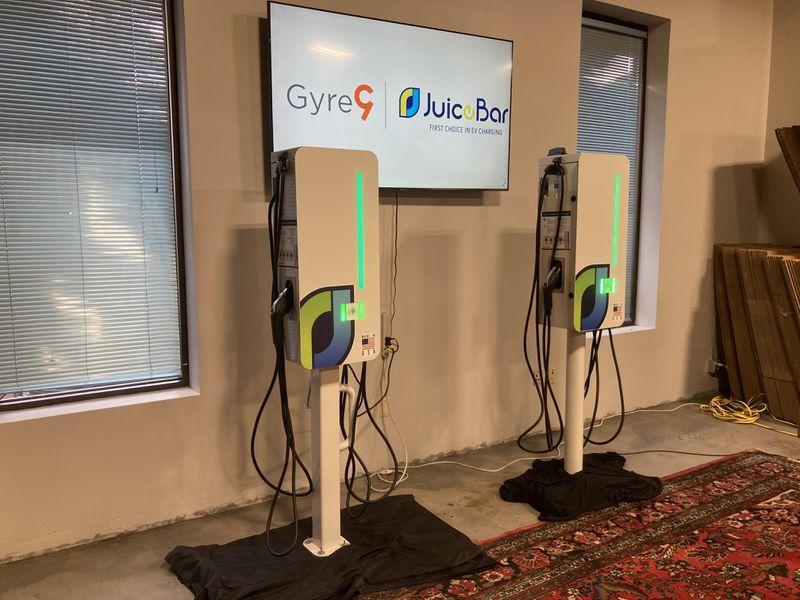Paul Vosper is applying his background in commercial real estate to the manufacture of electric vehicle chargers.
As president and chief executive officer of JuiceBar, with offices in Norwalk and East Hartford, he’s working to expand the use of chargers at apartment complexes and other large-scale building sites.
He and a partner bought the assets of the EV charging business in 2018 from Garage JuiceBar, which was begun by executives of Propark Mobility, a Hartford parking management business. “This is primarily a real estate play,” he said.
David Schmid, chief investment officer of Propark, said he and his older brother, John, the chief executive officer of Propark, started Garage JuiceBar because they realized electric vehicles were a growth industry drawing federal investment in the early years of the Obama administration. “We saw it coming, and we wanted to start thinking about it,” he said.
While a connection between real estate and zero-emissions vehicles is not obvious, it shows the diversity of businesses being established to capitalize on rapidly rising demand for nonpolluting cars and trucks.
JuiceBar is one of two companies in the Greater Hartford area manufacturing EV chargers. The other company, EVSE LLC, is based in Enfield.
Super-chargers placed along highways are one source of power for electric vehic les. However, they account for few opportunities to charge, while malls and supermarkets are ineffective charging sites during brief shopping trips, Vosper said.
les. However, they account for few opportunities to charge, while malls and supermarkets are ineffective charging sites during brief shopping trips, Vosper said.
JuiceBar instead targets hospitals, hotels, office buildings and apartment complexes, “where people are going to be for a couple of hours,” he said.
“More and more of the charging environment is going to be a lot like your cellphones,” Vosper said. “You charge from the bedside table at night. You charge at the office when you’re running a little bit low. When you move to EVs, you’ve got to lose the gas-station mentality.”
Earlier this month Gov. Ned Lamont visited JuiceBar’s manufacturing site in Oxford, talking up electric vehicles just weeks after he abandoned efforts targeting cars and trucks that belch fumes along Connecticut’s highways.
“We’re doing OK on the electric grid in terms of bringing down our carbon footprint,” Lamont said Friday. “We still have a way to go on transportation. This is so important as we continue to move away from the internal combustion engine.”
Electric vehicle chargers at JuiceBar’s Oxford manufacturing site. (Alex Putterman)
The governor has had an easier time seeking to de-carbonize the electric grid. He issued an executive order two years ago requiring the state Department of Energy and Environmental Protection to analyze and recommend strategies to achieve a 100 percent zero carbon target for the electric sector by 2040.
The next big burst in electric vehicle charging is the $1 trillion federal Infrastructure Investment and Jobs Act that earmarks $7.5 billion to support construction of a nationwide network of 500,000 EV chargers to accelerate electric vehicle use.
A spokeswoman said the Connecticut Department of Transportation is waiting for federal guidance on details such as how federal money may be spent and the type of charging equipment.
Desmond Wheatley, CEO of Beam Global, a San Diego technology company that provides renewable charging equipment for electric vehicles, said tens of millions of charging sites will be needed in the next few decades. Extending the grid to where motorists park their cars will be difficult, he said.
Beam Global’s products generate and store electricity from renewable sources rather than drawing power from the grid. It announced Thursday that New York City has deployed more of its solar-powered EV charging systems, expanding the fleet to 89.
It already has federal contracts in hand and will benefit from the infrastructure spending measure approved last month by Congress and President Joe Biden, Wheatley said.
“Politically, they’re looking for shovel ready projects. We don’t need a shovel,” he said.
JuiceBar, capitalizing on the industry’s growth, is moving to a site larger than its Oxford location, and Vosper expects to add 100 manufacturing and engineering jobs in the next year, tripling the workforce of 45 now.
Manufacturers of components used in the chargers also will likely add 200 jobs, he said.
Staff writer Alex Putterman contributed to this report.
Stephen Singer can be reached at ssinger@courant.com.




